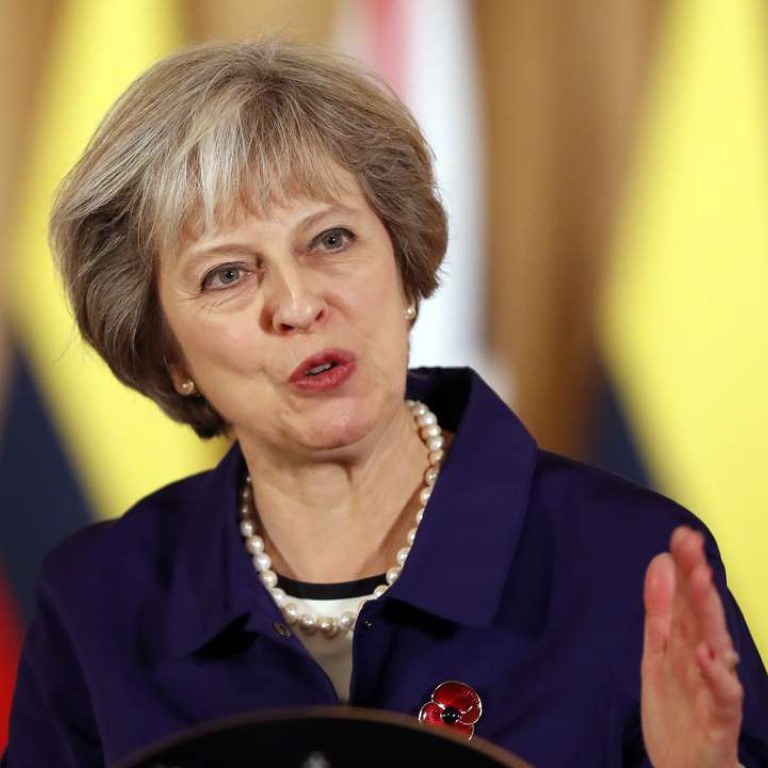
UK’s PM Theresa May says Brexit timetable ‘unchanged’, confident of winning appeal against shock ruling
British Prime Minister Theresa May on Friday told European leaders that her March deadline for triggering Brexit negotiations “remains unchanged” despite a court ruling that she first needs parliament’s approval.
May told European Commission President Jean-Claude Juncker and German Chancellor Angela Merkel that the “government’s planned timetable for notification of Article 50 remains unchanged”, during separate phone calls, according to a statement released by Downing Street.
She added the government was confident of winning its appeal against Thursday’s High Court ruling that it must seek parliament’s approval before starting EU exit talks.
“The PM explained to both Chancellor Merkel and President Juncker that while the government was disappointed with the judgement, it had strong legal arguments ahead of the case moving to the Supreme Court,” the statement said.
She later relayed the same message in calls to French President Francois Hollande and European Council President Donald Tusk.
The decision raises the prospect of a protracted parliamentary debate, although EU leaders have urged a swift departure.

Lawmakers could demand to know May’s negotiating strategy and seek to maintain strong ties with the bloc before agreeing to invoke Article 50, which the premier has said she will activate between the New Year and the end of March.
Former deputy prime minister Nick Clegg, from the centrist Liberal Democrat party, told BBC radio that he and other pro-EU lawmakers would seek “to amend the legislation such that parliament would say to government it should pursue a soft Brexit, not a hard Brexit”.
A so-called “hard Brexit” would see Britain pull out of the bloc’s single market and impose tough immigration controls.
In a sign of the likely parliamentary storms ahead, pro-Brexit Conservative lawmaker Stephen Phillips resigned as an MP on Friday, citing “irreconcilable policy differences with the current government”.
He said “quitter” was a label he could live with, but “Conservative no longer is”.

The resignation has fuelled speculation of an early general election, though Downing Street maintains that polls should not be brought forward from 2020.
It leaves May’s centre-right Conservative government with a slim working majority of 14 in the 650-member House of Commons.
Speaking in Berlin, British Foreign Secretary Boris Johnson, who led the Brexit campaign, played down the impact of the High Court ruling.
“The British people voted to leave the European Union, and leave the treaties of the European Union, and that is what we are going to get on and do,” he said.
The pound – which has tumbled to multi-year lows since the referendum – soared against the dollar and euro, standing at US$1.25 during afternoon trading in London.
Meanwhile, the White House urged Britain and the EU to “continue to be flexible and work this out in a process that is smooth, pragmatic, transparent and productive” following the court ruling.
The court’s decision sparked fury among newspapers that backed Brexit, accusing the judges of “betraying” the 17.4 million people who voted to leave the EU.

Most members of parliament wanted to stay in the bloc, but commentators believe there is no majority support for reversing the referendum result.
The case challenged the government’s right to use “historic prerogative powers” – a type of executive privilege – to trigger Article 50, which begins a two-year countdown to exiting the EU.
Flamboyant plumbing tycoon Charlie Mullins, who is financially backing the legal challenge, said the ruling was a “very good victory and is morally correct, and we’ve cleared up a point now who is legally entitled to do it”.
“Why would you go against three top court judges?” he said of the government contesting the ruling. “I’m a plumber and I can work it out, what’s legally right.”
But businesswoman Gina Miller, the chief claimant, was bombarded with abuse on social media after the hearing.
Nigel Farage, the interim leader of the anti-EU UK Independence Party, said that any lawmakers who attempted to delay Brexit had “no idea of the level of public anger they will provoke”.s

.png?itok=arIb17P0)